Welcoming the Ukrainian stranger
The titanic problem of the Ukrainian refugee crisis, as seen from the border
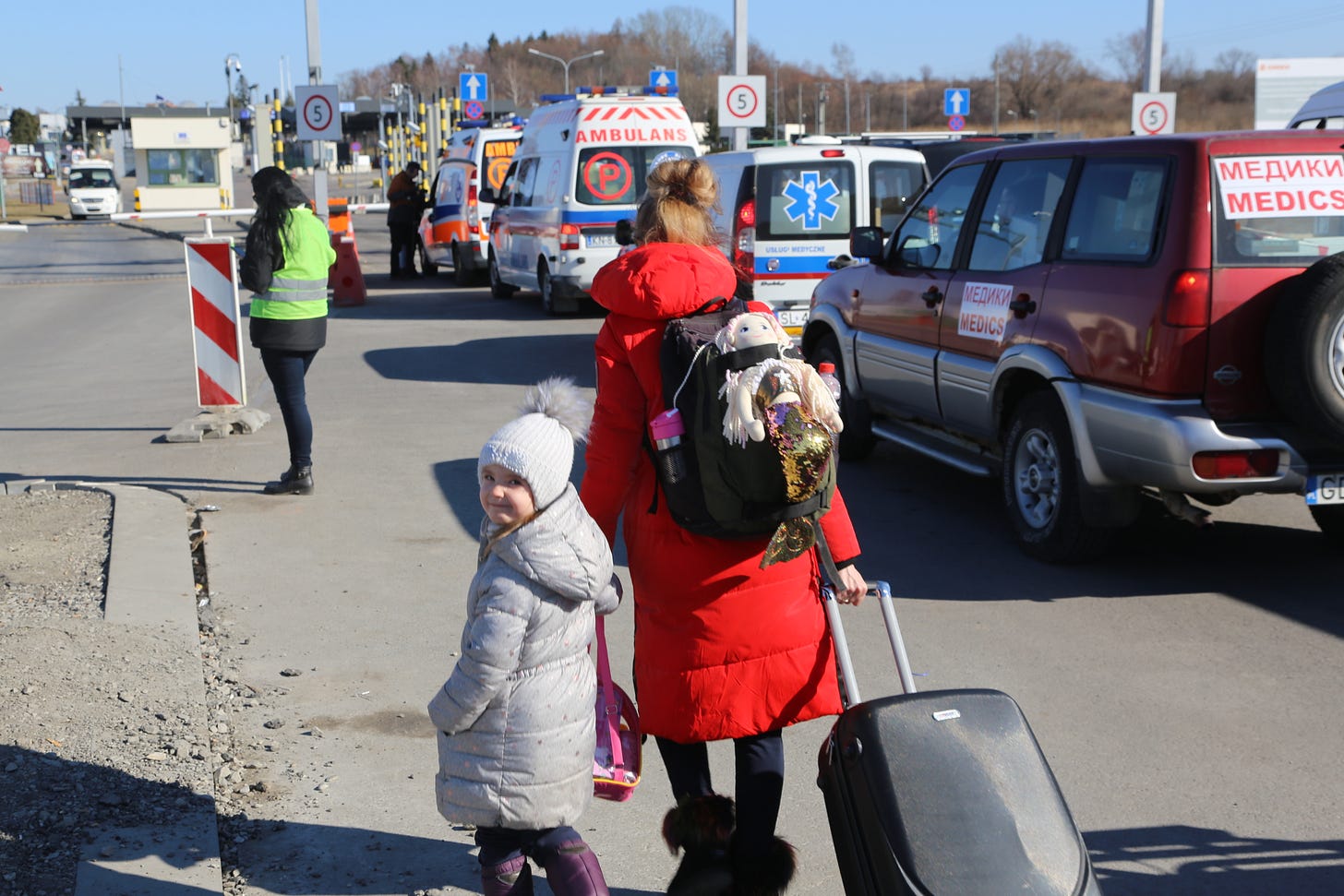
The Ukraine story is too important, so I’m removing the usual preview/paywall on all Ukraine-related Pull Request posts. That said, Ukraine content is even more expensive to produce than regular fare, so please consider subscribing.
The strangers who reside with you shall be to you as your citizens; you shall love each one as yourself, for you were strangers in the land of Egypt: I am the Lord your God.
-Leviticus 19:34
They come walking across, abandoning whatever got them there, whether a bus or their own cars. Usually it’s a mother with children dragging one of those rolling bags that fit into airline carry-on. Often they have a pet carrier of some sort, though sometimes the family dog just walks along with the family. Very occasionally it’s old people who look beleaguered and exhausted and incredulous that they’re doing this at their age. There are almost no men as the Ukrainians will stop any man aged 18 to 60 from leaving: every able-bodied adult male is officially mobilized to repel the Russian invader. Over four million Ukrainians have fled the country (and over six million are internally displaced), and most of them come lurching across the border, bags in hand, as you see pictured here.
In the border village of Medyka, Poland, at the end of a long, busy walk through lines of bunched refugees, meandering volunteers, and rows of tents and kitchens, you’ll reach as far as you can go without crossing. There, flanked by a squad of Polish police keeping everyone but actual crossers out, is a portal to a different world … the world of the Ukraine war. It’s where the Western world of NATO and human rights and peace and stability ends and something else altogether begins.
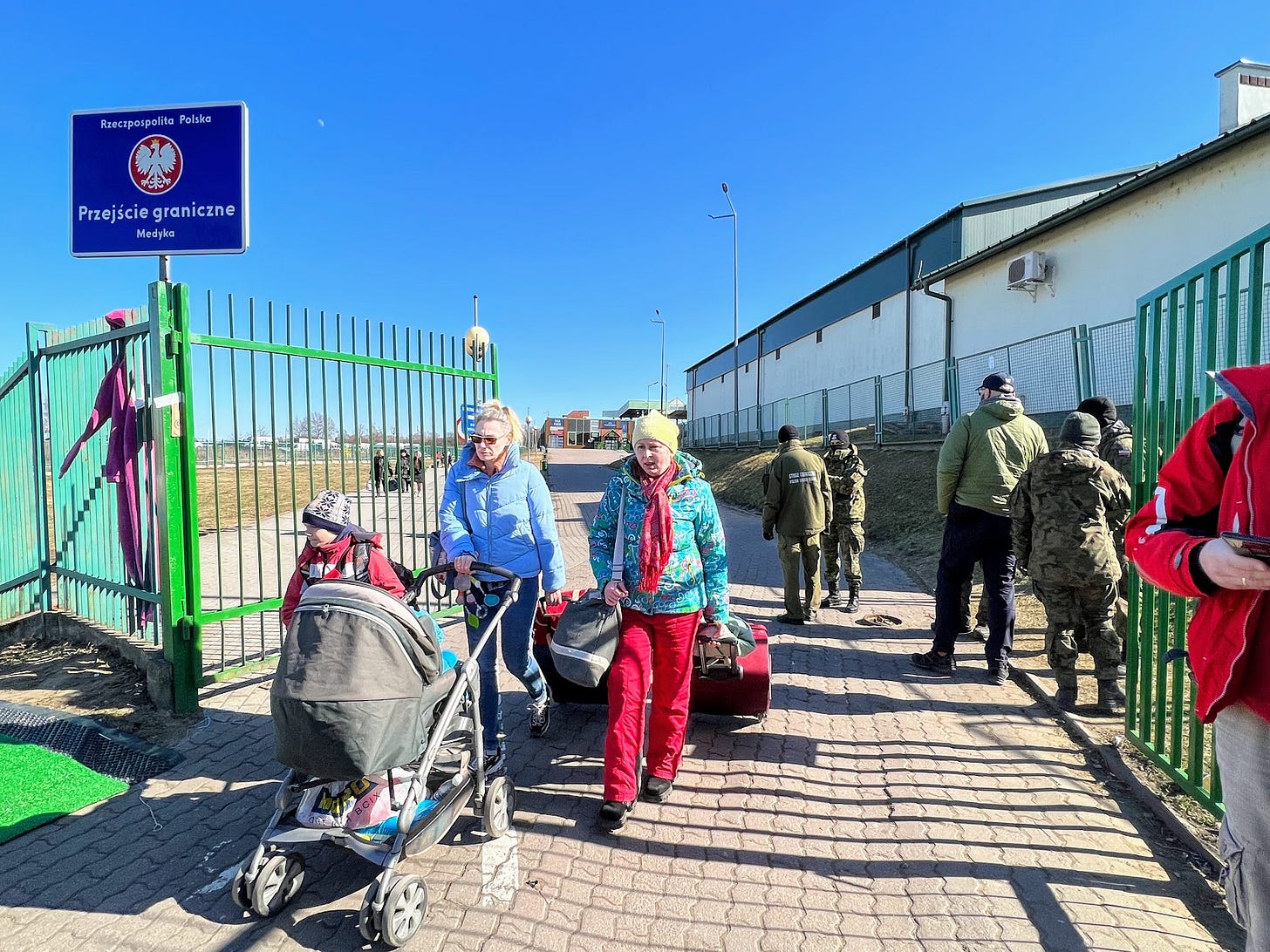
Many relatives wait there anxiously, a much more dramatic version of the exit gate at an airport. When their family member finally comes out—maybe they were incommunicado, maybe this comes at the end of a three-day odyssey—there’s often crying and embracing. The vulture-like TV journalists loitering nearby swoop in for footage, and the waiting party takes their relative’s luggage as tears are wiped and plans exchanged. They made it … their family finally made it out of the war.
For those who don’t have family waiting, a volunteer offers the children chocolate and everyone else food. There’s a procession of food trucks on the way from this portal-to-a-different-world to the waiting buses: everyone from Jose Andrés’ World Central Kitchen (which was omnipresent in the border region) to the United Sikhs offering tandoori. The Polish Boy Scouts have set up tents for those too exhausted to continue, or who need to warm up for a bit; it’s bone-chillingly cold, and many of the tents have wood stoves going, which fill the entire area with a woodfire odor.
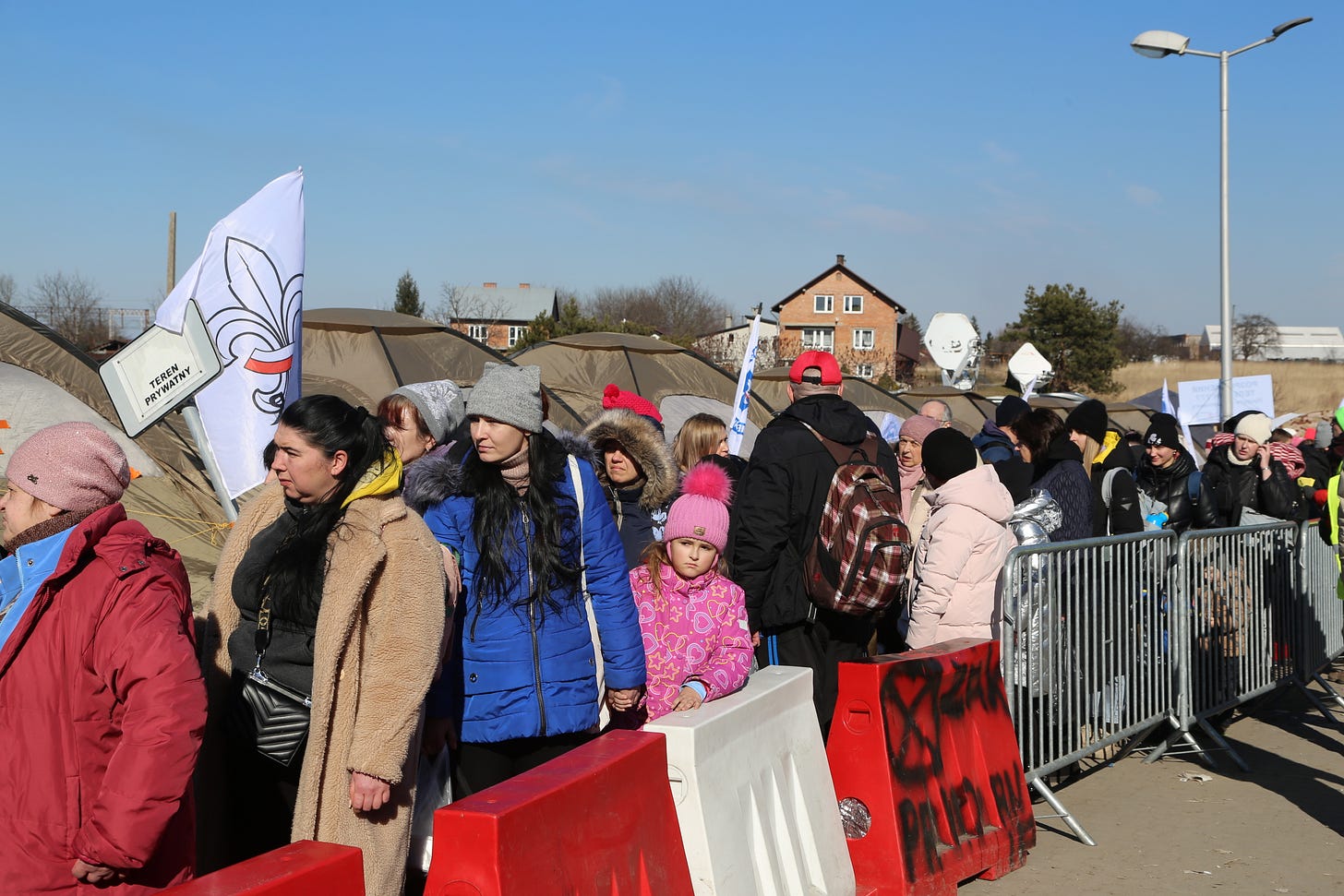
As part of this spontaneous order amidst disorder, there’s a a line of buses and volunteer transport meeting a line of refugees, and this intersection of vehicles and pedestrians runs all day getting people out of the cramped border crossing. The next stop is the big-box warehouse everyone refers to as the ‘Tesco’ (a European version of Walmart). The Tesco itself has long since been shuttered, but the enormous building and parking lot have been requisitioned as a staging and triaging center for the refugee stream. You enter the building (here, Polish police instruct me not to take photographs), and what used to be the mundane trappings of retail life—the customer help desk, perhaps the local bank with an indoor storefront—have been requisitioned for refugee use: there’s the driver registration for people taking refugees out, over there is SOS Refugiados, a Spanish NGO offering settlement in Valencia, and there are the Israelis getting Jews out. The large open spaces where racks and shelves full of merchandise once stood have now been converted into an expanse of cots, with the occasional stockpile of food or bedding. Imagine your local Walmart or Costco absolutely gutted of all merchandise and goods, and suddenly inhabited by thousands of families fleeing a war, and you’d have a good picture of it.
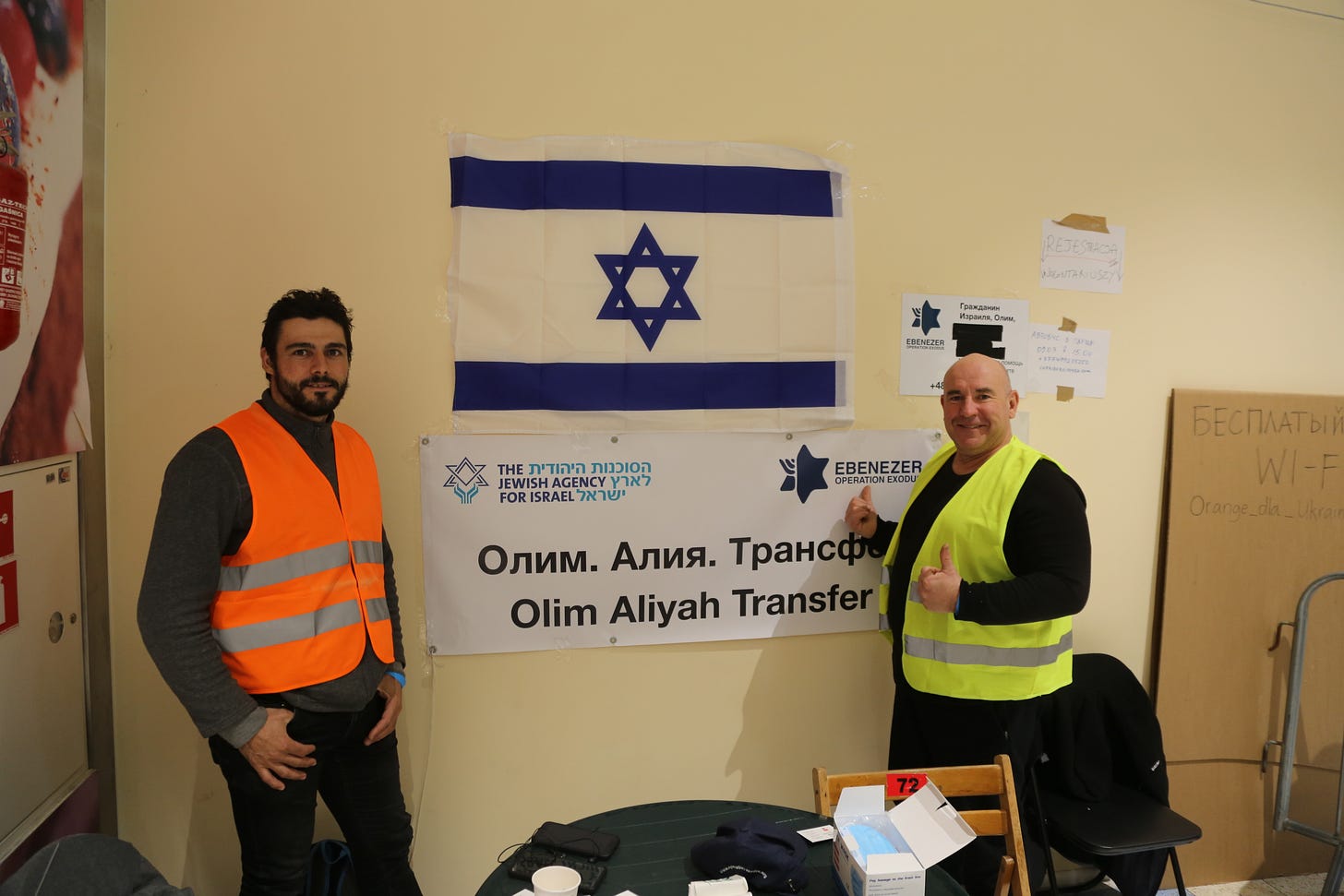
For as chaotic as this could all be, there’s little in the way of disorder and nothing that resembles violence or mayhem. The burly Polish cops, border guards, and soldiers everywhere keep a stern eye on all that. There have been reports of refugee exploitation and attempts at trafficking—our translator shared some anecdotes of suspicious incidents, and some arrests have been reported—but overall there’s a general vibe of collective effort and volunteerism.
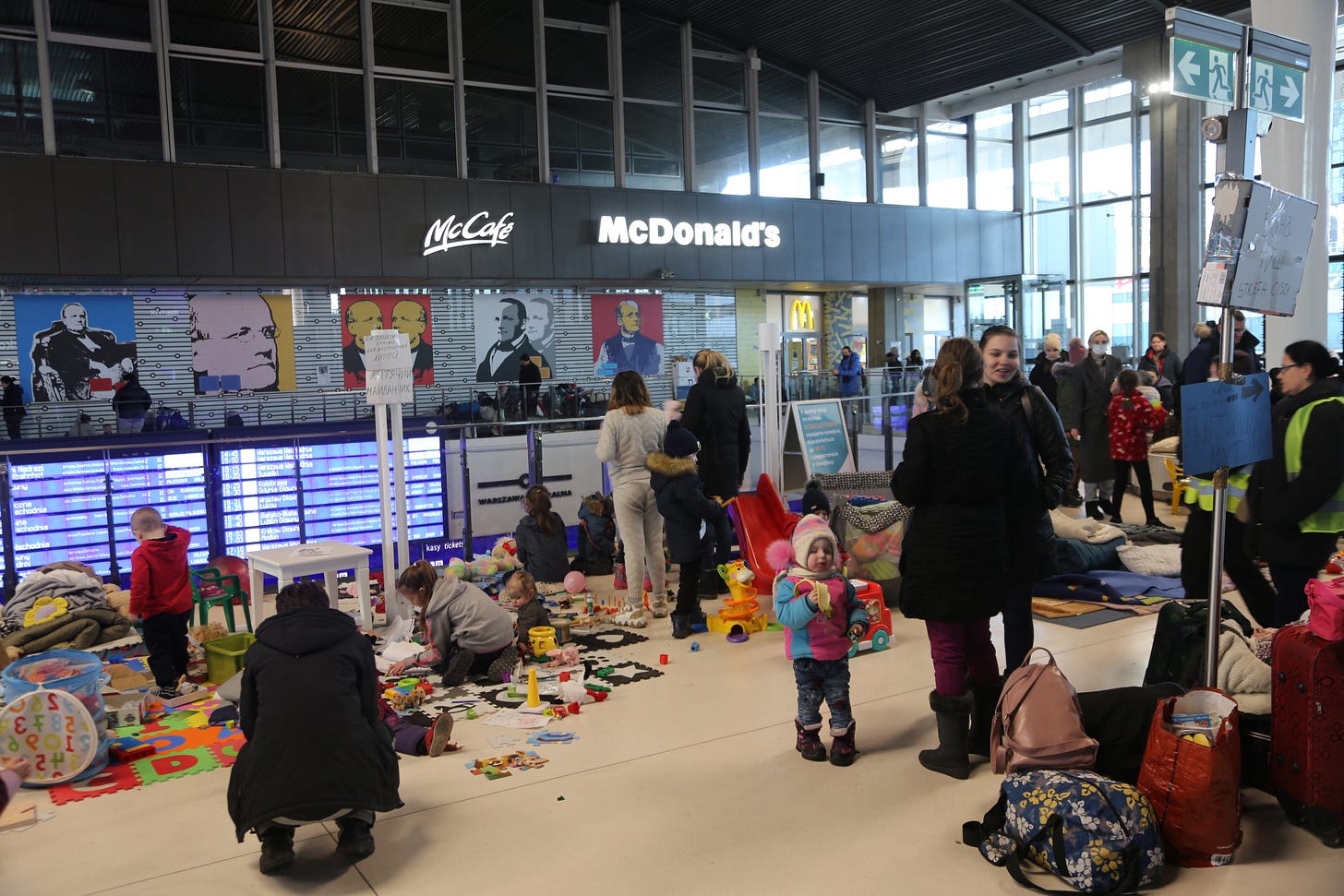
Everyone helps out, either guiding the stumbling refugees with their luggage (something the Polish border guards do often), or passing along information to refugees about rides or resources they can use to make their way, or bringing in supplies for the refugees (sometimes into Ukraine itself). Some examples, with accompanying photos:
A German group drove a van full of medical supplies, and is stuck on the Polish side because their customs declaration forms aren’t in Ukrainian. As one sees repeatedly at the border, they’re not part of any official group or effort, simply Europeans who sprung into action at the news. The woman leading them remarks to me, tapping her torso: “We’ve got these armored vests on, but we didn’t plan on customs problems.” Our Ukrainian and Polish-speaking interpreter tries to get them a written translation, and we guide them back to the main refugee reception center where there’s a bit of administrative infrastructure.
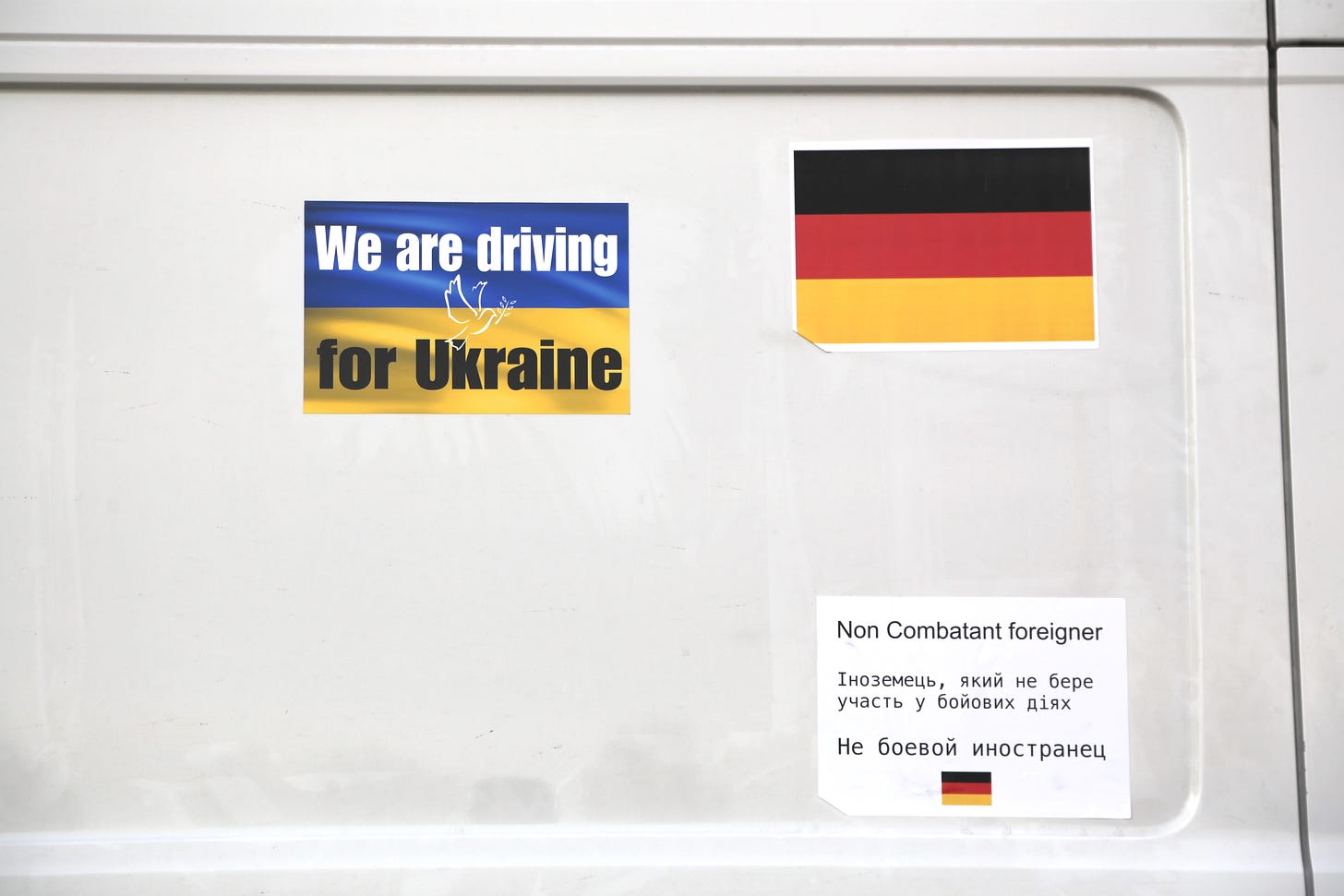
At the Budomierz crossing, a much smaller crossing whose refugee camp is the size of a parking lot, a couple of middle-aged Polish women bundled-up against the cold stir a pot of krupnik (a Polish meat and barley soup). I ask them if they’re part of any organization, and they reply that no, they’re simply from a neighboring village and set up their soup stand when the crisis started. She then offers me a bowl of krupnik which I felt obliged to accept (it was very good and bracing against the cold).
At the entrance to the refugee camp, I overhear the strange sound of American-accented English. A wiry guy in a baseball cap and a telltale Carhartt jacket is discussing destinations with a group of refugees with poor English. While our interpreter straightens things out with the refugees, I ask the American where he was from and he responds, “Richmond, Virginia!” Frank Pichel is an artist who bought a one-way ticket to Poland, rented a car, and drove to the border to help however he could. He is now shuttling group after group of refugee families to wherever they need to go in Poland (you can see some of it at his Instagram).
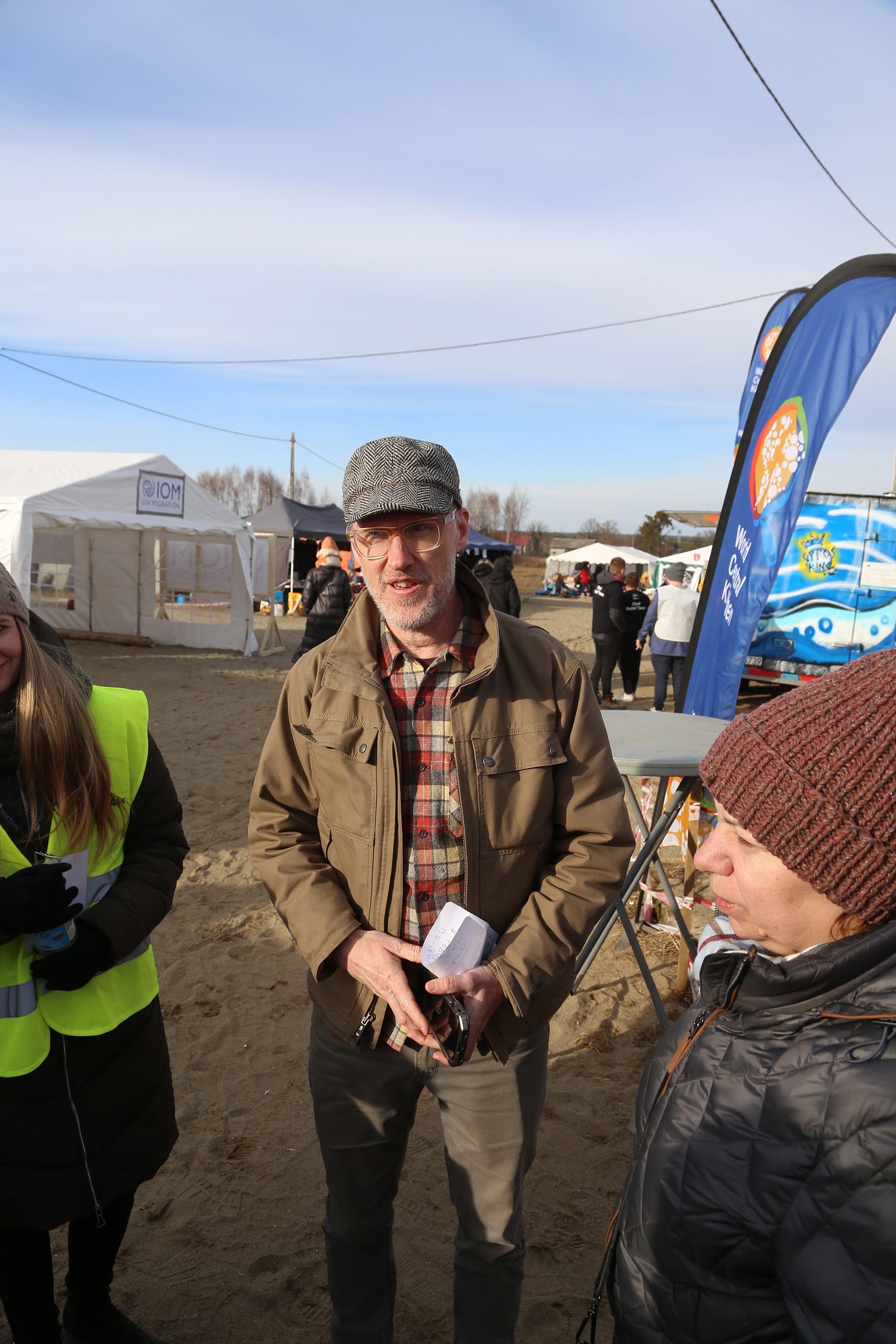
What’s miraculous about all this is that while the Polish government provides much of the law-and-order basics of the refugee logistics, as well as offers the use of infrastructure like empty buildings, the vast bulk of the actual aid is handled by self-organized NGOs and volunteers. The actual feeding and housing of refugees is almost exclusively being handled by private individuals and a random-seeming assortment of organizations. Europe is witnessing the largest refugee crisis since World War Two—millions of people suddenly on the move—and it’s mostly charity-minded do-gooders taking in the Ukrainians and caring for them.
Another of the very striking things in the border region is how, in the midst of very undignified circumstances, the Ukrainians manage to maintain a sense of human dignity. In the Przemyśl train station—like all train stations in Eastern Poland, now a de facto refugee camp—a family had staked out their own blanket space in a hallway. As in most such family plots, it had the few bags containing all the family’s belongings and some toys for the children. In this relative peace in the middle of an otherwise loud and bustling station, a grandmother very carefully did her granddaughter’s hair, a tableau of sanity in a world that suddenly seemed insane.
Where this ends is anyone’s guess. The refugees I spoke to all wanted to return to Ukraine. Many had left husbands, fathers, and sons fighting, and they had little desire to start anew in a foreign country. Surely, there are those who will stay as they have nothing to return to in Ukraine, and Ukraine is still a country with a relatively low GDP per capita. The Polish government is allowing Ukrainians to stay in country for 18 months with no visa and no questions asked, an extraordinary level of magnanimity toward a neighboring people in a horrible bind. But what happens a year from now as the cost of supporting the Ukrainians mounts, and the war is still dragging on? Right now, none of that seems to matter. There is one but one goal, and that’s to handle the humanitarian crisis and help the Ukrainians win the war.
As depressing and barbaric as the Russian invasion of Ukraine is, the border situation is a humanistic rebuke to the cruel militarism of Putin’s murderous ambitions. The volunteers, aid groups, and refugees on the Polish border have managed to create, to use Rebecca Solnit’s memorable phrase, ‘a paradise built in hell’: an oasis of collective good will and generosity alongside an apocalyptic nightmare of death and destruction. It’s an extraordinary show of humanity, something of which Europe can be rightly proud. All the more as this mobilization was whipped up not by EU fiat, though member countries are certainly budgeting money for aid, but by the overwhelming kindness of everyday Europeans toward a neighboring nation. We recoil in horror at the heinous news coming out of Mariupol, or the recent images of bound and executed civilians in Bucha, and the inhumanity that represents. But what’s going on at the Polish border is also part of the Ukraine story, something even Russian brutality shouldn’t completely overshadow.

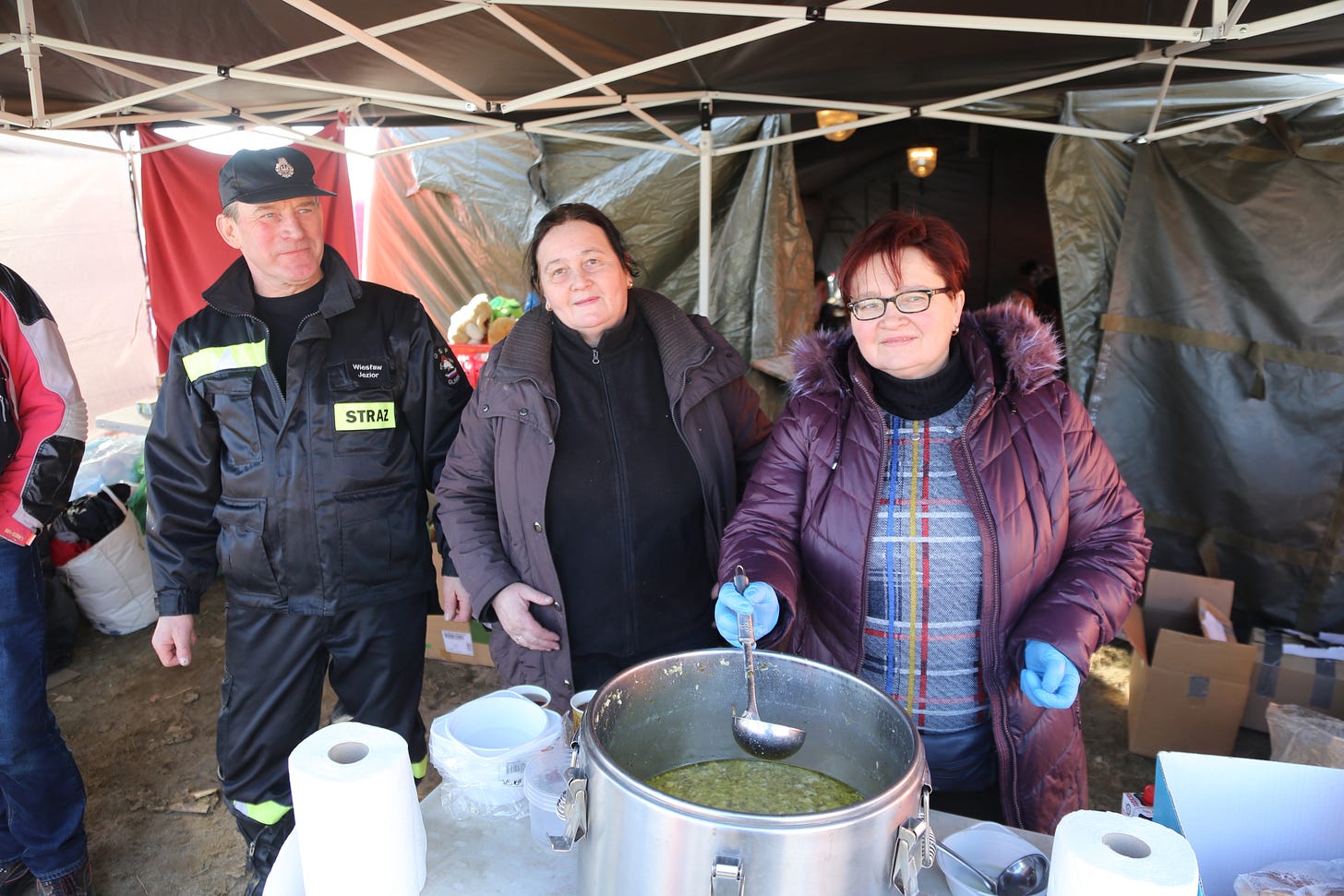

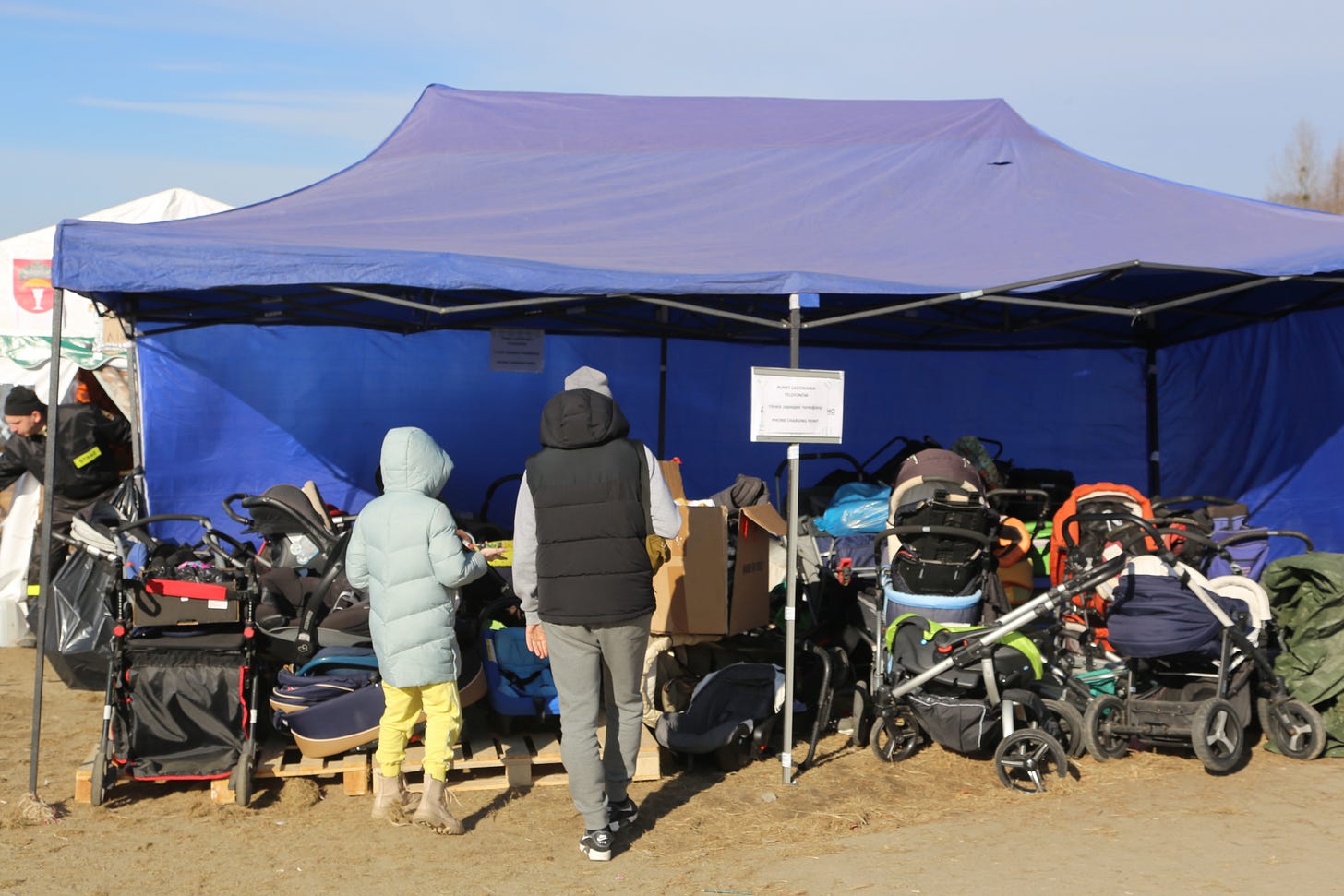
Sadly, no.
Lovely. Thank you.